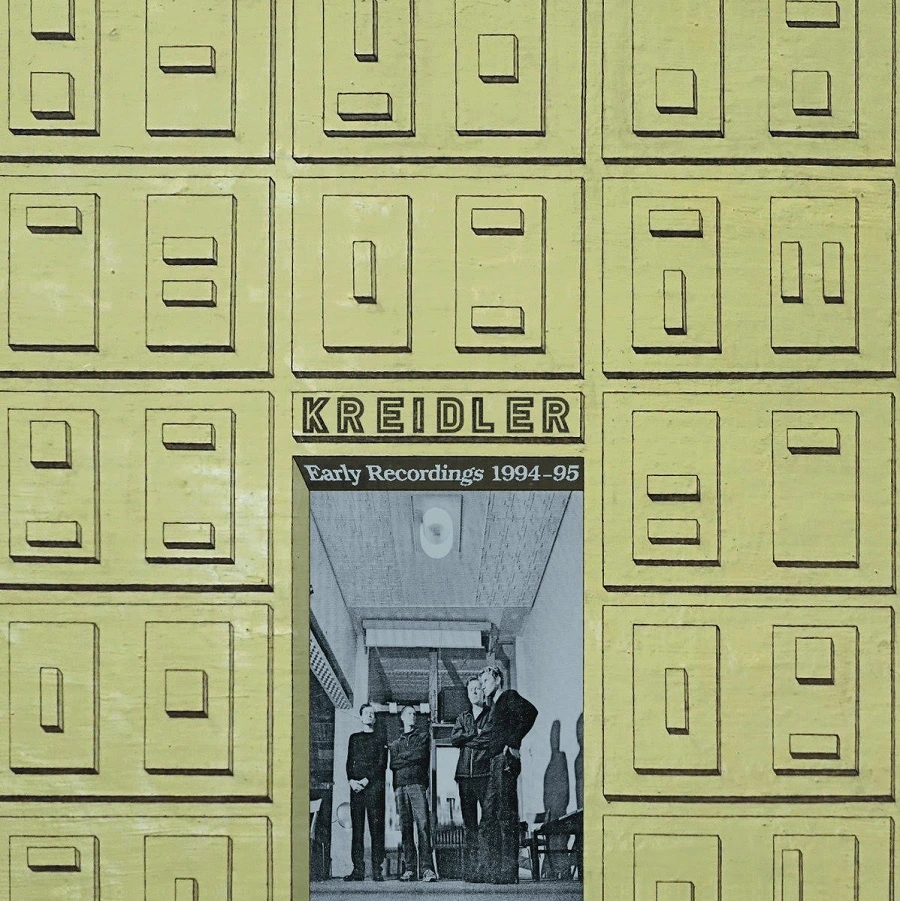Kreidler – Early Recordings 1994-95
Somewhere in a former bakery in Düsseldorf, in the summer of 1994, something remarkable happened. Four young art students, Thomas Klein, Andreas Reihse, Stefan Schneider, and Detlef Weinrich, pressed ‘record’ on a modest 4-track cassette recorder and captured what would later become the foundation of one of Germany’s most consistent experimental bands. These recordings, forgotten for thirty years, have finally been compiled properly on “Early Recordings 1994-95”. For collectors who had scoured Discogs in vain for the original RIVA cassette, this is like the cave of Ali Baba finally opening.
It is tempting to dismiss Kreidler as yet another group following the great Düsseldorf tradition of Kraftwerk, NEU!, and DAF, but this seriously underestimates the band. Where Kraftwerk presented the future as a polished, automated utopia, Kreidler seeks friction between humans and machines. ‘We are a band that integrates electronic elements into a living, breathing whole,’ bassist Alex Paulick recently told Maxazine. ‘Not the other way around.’ This philosophy, the human factor in a digital age, is evident from the first notes of this archive album and forms the core of Kreidler’s identity.
“Early Recordings 1994-95” is not an ordinary compilation. It combines the original RIVA cassette from 1994 with the untitled Finlayson mini-album from 1995, both released in tiny editions and long considered lost. What stands out is how complete the sound already was. Opener “Beginn / Drücken” immediately establishes that typical Kreidler groove: not the tight mechanics of NEU!, but something more organic, more erratic. This is not music aiming for machine-like perfection, but celebrating human imperfection.
The German scene of the early 1990s was a strange transitional period. The Wall had fallen, the krautrock old guard was museum material, and Düsseldorf’s Altstadt, the grim student district around the art academy, was incubating something new. While post-rock bands like Tortoise in the US reimagined instrumental pop with jazz influences, Kreidler sought a different path: dub echoes, spoken word, and a refusal to conform to what an ‘experimental electronic band’ was supposed to be. The result still sounds liberatingly uncategorised thirty years later.
Take “Tierfilm”, finally listenable after three decades in obscurity, with its wobbling dub rhythm that seems to float on a sea of tape hiss. Or “Charles Wilp fotografiert Muhammed Ali”, a cheerful, almost danceable track that undermines the seriousness of much post-rock with a hefty dose of humour. But the absolute highlight is undoubtedly “Angst”. The Fehlfarben cover, with Julia Friedrich speaking the lyrics over a nervous, chopped rhythm, is far more than a tribute to fellow city dwellers. Where the original was a ska-like post-punk song, Kreidler completely deconstruct it and rebuild it into a wholly original concept. It’s as if they take the blueprint of Germany’s new wave past and view it through a different lens: slower, darker, more abstract. This is deconstruction in its most literal sense, and the result is brilliant.
Then there is “Bikini”, a track that places you directly in that former bakery. You stand next to the band in their rehearsal space. The bass drum creeps forward over the chipboard floor, threatening to shake loose and needing duct tape to hold it in place. The synths weave through your head like cigarette smoke, while the bass drives into your hamstrings. It’s raw, unpolished, and precisely because of that so irresistibly real. This is not music pretending to be recorded in a fancy studio; this is the rehearsal space, in all its glorious imperfection.
There is also a danger: is this album mainly interesting as an archival piece? A collector’s item for hardcore fans who have been following for decades? A fair question. Tracks like “Sportfläche” are more atmosphere impressions than finished compositions. But what transcends this album is its sincerity. At a time when, as Paulick warned in the same interview, ‘every week more than 9000 AI-generated tracks appear on streaming platforms’, “Early Recordings” feels like a statement. This is music made by people standing together in a room, making mistakes, whose drummer can only sit at his kit for ten minutes due to back pain, whose car gets wrecked on the way to Hamburg.
And that is exactly what makes Kreidler timeless. While Kraftwerk always cultivated a certain detachment, the human as machine, Kreidler is fundamentally human. ‘The groove you hear throughout our work comes from the fact that we are essentially a band that plays together,’ said Paulick. On “Early Recordings”, you hear that truth fully formed: in the way “Boccia” slowly bursts at the seams, in the melancholic closer “Im Betrieb (IV)”, which sounds like Miles Davis’ “In a Silent Way” reimagined for a generation raised on techno.
Their label, BuroB, has with this reissue served music history, but above all Kreidler itself. These recordings document not just the beginning of a band, but of a philosophy: that experimental music need not come at the expense of feeling, that electronics do not mean the human touch disappears. ‘We will continue making music as long as we feel it matters,’ said Paulick. Based on these early recordings, it has led somewhere since 1994. Thirty years later, still. (8/10) (BuroB)
![]()





